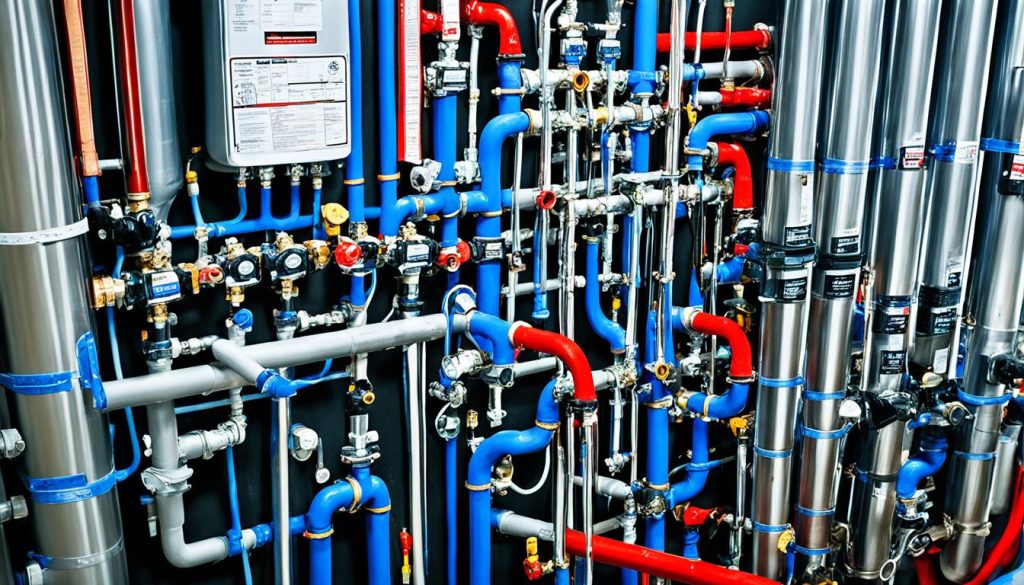Texas Plumbing Code Guide & Compliance Tips
Did you know that the state of Texas has its own plumbing code with specific regulations and requirements? Understanding and complying with the Texas plumbing code is essential for ensuring the safety, health, and environmental responsibility of plumbing projects in the Lone Star State. From licensing and training requirements to plumbing code compliance, permits and inspections, and environmental considerations, there’s a lot to know to ensure your plumbing projects are up to par.
Key Takeaways
- Complying with the Texas plumbing code is crucial for the safety, health, and environmental responsibility of plumbing projects.
- Texas has different types of plumbing licenses, including Apprentice Plumber, Tradesman Plumber-Limited, Journeyman Plumber, and Master Plumber, each with its own requirements.
- All plumbing installations, alterations, repairs, replacements, or remodels in Texas must adhere to the Uniform Plumbing Code (UPC).
- Obtaining the necessary permits and undergoing inspections are vital steps in ensuring plumbing projects meet the state and local plumbing codes.
- Plumbers must comply with environmental regulations to protect public health and the environment when working on septic systems.
Licensing and Training Requirements
As a licensed plumber in Texas, I understand the importance of meeting the state’s requirements to provide plumbing services legally. The Texas State Board of Plumbing Examiners (TSBPE) mandates that all plumbers must hold a valid license. Depending on your career goals and level of experience, there are several types of licenses available:
- Apprentice Plumber: This license allows individuals to work under the guidance of a licensed plumber while gaining hands-on experience and completing the required training.
- Tradesman Plumber-Limited: With this license, plumbers can work on plumbing projects that are less complex and have certain limitations.
- Journeyman Plumber: Achieving a Journeyman license requires a minimum of 8,000 hours of supervised experience under a Master Plumber. This level of licensure allows plumbers to work independently on most plumbing projects.
- Master Plumber: To become a Master Plumber, plumbers must hold a Journeyman license for at least one year and pass a rigorous state examination. This license allows plumbers to operate their own businesses and take on complex plumbing projects.
Each license has its own set of requirements, which include educational training, practical experience, and passing the state examination. These licensing and training requirements ensure that plumbers in Texas have the necessary knowledge and skills to provide high-quality plumbing services to their clients.
| License Type | Requirements |
|---|---|
| Apprentice Plumber | Completion of an apprenticeship program and passing the state examination. |
| Tradesman Plumber-Limited | Completion of relevant training and passing the state examination. Limited to certain plumbing projects. |
| Journeyman Plumber | At least 8,000 hours of experience under a Master Plumber, successful completion of the state examination. |
| Master Plumber | Hold a Journeyman license for at least one year, pass the state examination. |
Plumbing Code Compliance
In Texas, adhering to the plumbing code is essential to ensure the safety and functionality of plumbing systems. The plumbing code that governs plumbing installation standards in Texas is the Uniform Plumbing Code (UPC). This code establishes guidelines for the design and installation of plumbing systems, aiming to maintain sanitation and ensure a reliable water supply.
Any plumbing work, whether it involves installation, alteration, repair, replacement, or remodeling, must meet the requirements specified in the Uniform Plumbing Code. Compliance with these standards is crucial to guarantee the safety, efficiency, and durability of plumbing systems in Texas.
By following the plumbing code, you can ensure that your plumbing systems adhere to the required standards. Plumbing installations that comply with the UPC provide a sanitary and safe environment, avoiding potential health hazards and minimizing the risk of plumbing issues.
Permits and Inspections
Before starting a significant plumbing project in Texas, it is crucial to obtain the necessary permits from the local authority. Permits ensure that the work being done aligns with the state and local plumbing codes.
Additionally, after the completion of the plumbing work, inspections are typically required. Inspections verify that the plumbing work meets the code’s requirements, is safe, and functions correctly. By obtaining permits and undergoing inspections, homeowners can avoid penalties and ensure that their plumbing projects comply with the necessary regulations.
Here are some key points to keep in mind regarding permits and inspections:
- Permit Requirements: Before starting any plumbing project, it is important to check with your local authority to understand the specific permits required. Different projects may have different permit requirements, so it is vital to obtain the correct permits.
- Application Process: The application process for obtaining plumbing permits usually involves submitting necessary documentation, such as project plans and specifications, to the local authority. It is important to follow the application instructions and provide all required information.
- Inspection Scheduling: After completing the plumbing work, homeowners or contractors need to schedule an inspection with the local authority. Inspections are typically conducted at different stages of the project to ensure compliance with plumbing codes and regulations.
- Code Compliance: During inspections, the plumbing work is evaluated to ensure it meets the necessary code requirements. Inspectors may check various aspects, such as pipe installation, fixture placement, venting, and drainage systems, to verify compliance.
- Non-Compliance Consequences: Failing to obtain the required permits or not complying with plumbing codes can result in penalties or the need to rectify non-compliant work. It is essential to prioritize compliance to avoid potential legal and financial consequences.
By following the proper permit and inspection processes, homeowners can ensure that their plumbing projects comply with the necessary regulations and codes. This not only helps maintain the safety and integrity of the plumbing system but also prevents potential issues down the line.
Remember, it is always recommended to consult with a licensed and experienced plumber who has a thorough understanding of the Texas plumbing code and can guide you through the permit and inspection process.
Environmental Considerations
When it comes to plumbing in Texas, environmental protection is a top priority. Plumbers must adhere to the strict regulations set by the Texas Commission on Environmental Quality (TCEQ) to ensure the proper installation and maintenance of septic systems. These regulations aim to safeguard public health and preserve the environment by ensuring effective wastewater treatment.
By following the environmental considerations outlined by the TCEQ, plumbers play a crucial role in maintaining the overall well-being of the community and preserving the natural resources of Texas.
Septic System Regulations in Texas
Proper septic system installation and maintenance are vital to prevent contamination of groundwater and surrounding areas. The TCEQ has established specific regulations that plumbers must adhere to when working on septic systems.
Wastewater Treatment in Texas
Effective wastewater treatment is essential to protect public health and ensure the cleanliness of water sources. Plumbers in Texas must follow the regulations set by the TCEQ to ensure that wastewater is appropriately treated and does not pose any environmental risks.
| Key Environmental Considerations for Plumbers in Texas |
|---|
| Complying with septic system installation and maintenance regulations |
| Proper wastewater treatment to prevent contamination |
| Maintaining the well-being of the community |
| Preserving the environment and natural resources of Texas |
Plumber’s Lien
In Texas, plumbers have legal recourse to ensure payment for their services through the use of a plumber’s lien. A plumber’s lien allows plumbers to place a claim against a property if they have not received payment for their labor and materials. This provides security for plumbers, ensuring that they are compensated for their hard work.
Plumbers play a vital role in maintaining the integrity and functionality of plumbing systems, and it is essential that they are fairly compensated for their services. The plumber’s lien serves as a powerful tool for plumbers to protect their rights and receive the payment they deserve.
The Process of Filing a Plumber’s Lien
When a plumber is not paid for their services, they can initiate the process of filing a plumber’s lien. Here is an overview of the steps involved:
- Notify the property owner: The plumber must first notify the property owner of their unpaid services either in person or through certified mail.
- File a Affidavit of Mechanic’s Lien: The next step is to file an Affidavit of Mechanic’s Lien with the county clerk’s office in the county where the property is located. The affidavit includes details of the plumber’s services, the amount owed, and a description of the property.
- Notify the property owner and other relevant parties: Once the affidavit is filed, the plumber must serve a copy of the affidavit to the property owner and any other parties with an interest in the property, such as mortgage holders.
- Enforce the lien: If payment is still not received after the affidavit is filed and served, the plumber can move forward with enforcing the lien. This may involve initiating a lawsuit to force the sale of the property to satisfy the debt.
It is important to note that the process of filing a plumber’s lien in Texas has specific time limits and requirements. Plumbers should consult with a legal professional to ensure they follow the necessary steps and meet the deadlines outlined by the law.
Protecting Your Rights as a Plumber
As a plumber in Texas, it is crucial to understand your rights and take necessary steps to protect yourself and your business. Here are some key points to consider:
- Keep detailed records: Maintain accurate records of all your services, including invoices, contracts, and any communication related to payment.
- Communicate clearly with clients: Set clear expectations regarding payment terms and timelines, and ensure that clients are aware of the consequences of non-payment.
- Consult with a legal professional: If you encounter difficulties in receiving payment for your services, seek guidance from a qualified attorney who specializes in construction law and mechanic’s liens.
By understanding and utilizing the option of filing a plumber’s lien, you can protect your rights as a plumber and secure the payment you are entitled to for your hard work.
Example of a Plumber’s Lien Form in Texas
| Property Owner | Property Address | Amount Owed |
|---|---|---|
| John Smith | 123 Main Street | $5,000 |
| Jane Doe | 456 Elm Street | $3,500 |
Hiring a Professional Plumbing Service
When it comes to plumbing projects in Texas, it’s essential to enlist the services of a licensed and reputable plumbing company. Hiring a professional plumber who is well-versed in the Texas plumbing code will ensure that your project is completed in compliance with all the necessary regulations and standards. Whether you’re facing a minor repair or a major installation, partnering with a knowledgeable plumbing service is crucial.
Choosing a reliable plumbing company means entrusting your plumbing needs to experienced professionals who understand the intricacies of the Texas plumbing laws. These reputable firms are dedicated to providing top-quality service and workmanship, taking into account every aspect of the plumbing code. By engaging the services of a licensed plumbing company, you can have peace of mind knowing that your project will be handled with expertise and precision.
By hiring a professional plumbing service, you benefit from their extensive knowledge and experience in the field. These experts stay up-to-date with the latest plumbing techniques and technologies, ensuring that your plumbing needs are met using the most efficient and reliable methods available. Moreover, a licensed plumbing company will have the necessary skills and equipment to tackle any plumbing issue, saving you time, money, and potential headaches.
When it comes to reliable plumbing services in Texas, look for licensed plumbers who have a proven track record of excellence. By choosing a reputable plumbing company that prioritizes compliance with the Texas plumbing laws, you can be confident that your plumbing project will be completed to the highest standards of quality and safety.
- Investing Wisely: How Windows & Doors in Boost Property Value and Financial Health - April 24, 2025
- The Financial Impact of Personal Injuries: Why Legal Help Matters for Business Owners - April 16, 2025
- The Hidden Financial Costs of Domestic Assault: What Business Owners Need to Know - April 16, 2025













